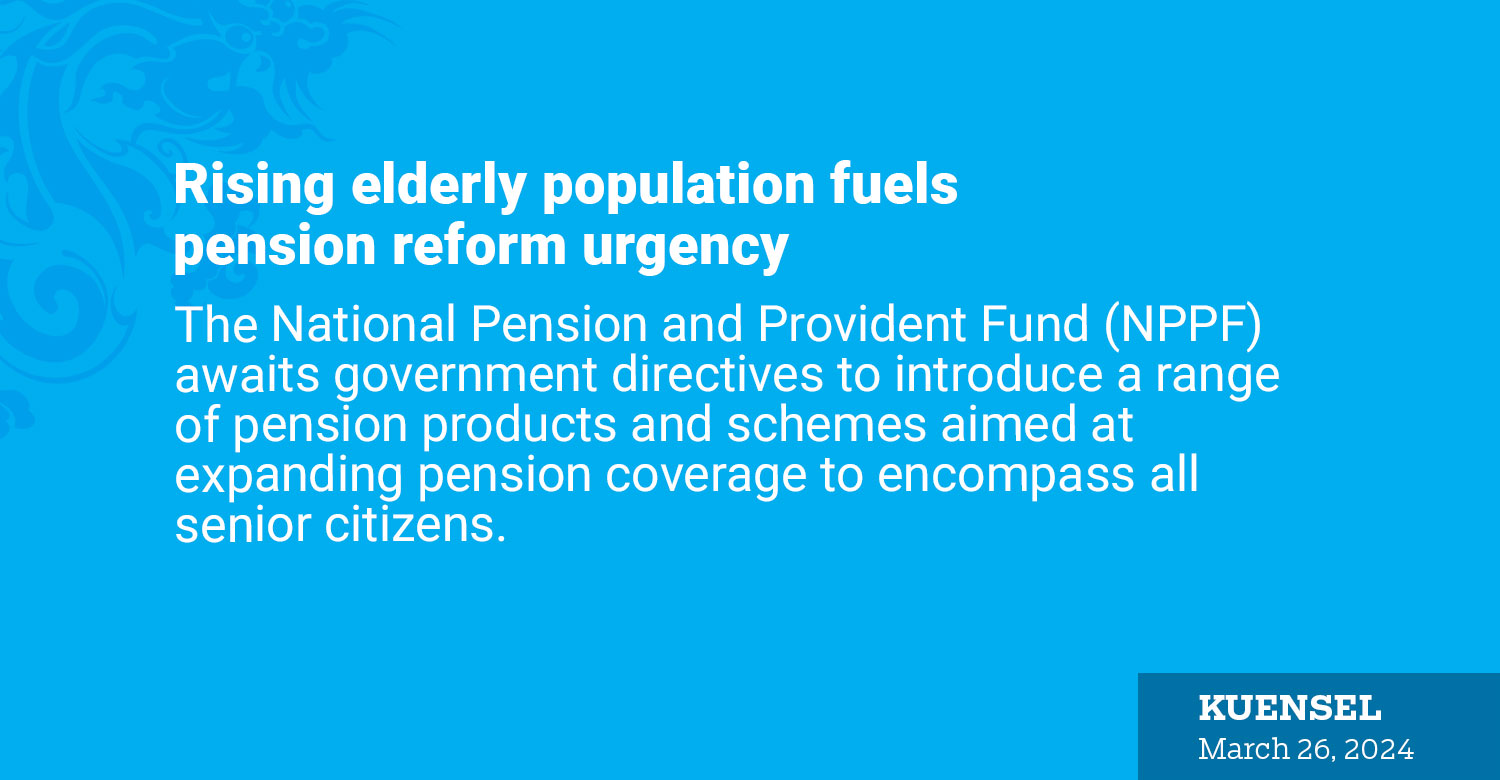Yangyel Lhaden
The National Pension and Provident Fund (NPPF) awaits government directives to introduce a range of pension products and schemes aimed at expanding pension coverage to encompass all senior citizens.
The National Policy for Senior Citizens (NPSC) of Bhutan was launched last year.
The NPSC states that the government shall explore the introduction of old-age allowances and expand coverage to all senior citizens through introduction of various pension products and schemes, including contributory and non-contributory schemes.
The Royal Society for Senior Citizens (RSSC), in collaboration with the Office of Cabinet Affairs and Strategic Co-ordination, is spearheading the policy’s implementation to provide guidance and co-ordinate efforts among various government agencies and stakeholders.
Tshering Namgay, executive director of RSSC, said that senior citizens face myriad challenges and social security is the main concern. “ We are going to hold a stakeholders’ meeting soon to discuss on the implementation of the senior citizens policy and advocate to the people nationwide.”
Bhutan is witnessing more and more older people because fewer babies are being born and people are living longer. Back in 2022, about 9.5 percent of the population was 60 or older. By 2047, this number is expected to double to almost 19.7 percent. Likewise, in 2022, about 6.6 percent of people were 65 or older, and this is projected to increase to 13.4 percent by 2047.
As per a report by the National Statistics Bureau (NSB) 2017, a significant portion of the elderly population in Bhutan faces financial challenges. About 63 percent of them have financial problems, with 15 percent struggling with debts. Twenty-two percent do not own land, 30 percent live in poor, and 26 percent do not have enough to eat.
Kuenga, a 65-year-old from Nubi, Trongsa works hard tending to his fields and protecting his crops.”As we grow older, money worries become more pressing. Back in our day, we raised many children, leaving little chance to save for our later years.”
Expressing doubt about whether the government can realistically provide allowances for the elderly, Kuenga said: “It may be challenging for the government to introduce allowance support but any form of monetary assistance would greatly help old people.”
Kuenga, like many elderly people, does not have a bank account. A survey by the Royal Monetary Authority (RMA) shows that 19.2 percent of banked individuals face financial exclusion. Among seniors aged 86 and above, a staggering 82.8 percent are excluded from financial services.
The exclusion rate for youth is 27.4 percent.
The financial exclusion pose significant challenges such as limiting the ability to save, invest, borrow, and manage their finance effectively, the report stated.
In Thimphu, Kota, aged 65, has a bank account. He regularly puts his savings into fixed deposit (FDs). When FD matures, he reinvests the money into new FD, maintaining a consistent savings habit.
“I am saving up money so that it can cover the expenses of my final rites,” Kota explained. “I do not want to be a burden on my child, so this money is specifically set aside for that purpose.”
Looking back, Kota observed that saving money wasn’t common in the past, mainly because people didn’t earn enough. But, with age, the worry about money and not wanting to be a burden on others has become more important to him.
“While NPPF aspires to be a reliable social security organisation in the country, it is mandated to look after the scheme and fund management of our members only,” an NPPF official said. “As the social security system’s main aim is to help people from falling into poverty, a kind of universal pension could be introduced for senior citizens.”
This would be a valuable proposition for the people who are already a member, as they will get this pension amount over and above what they get as an NPPF member, another official said.
“This would also provide a safety net for senior citizens who, for various reasons, couldn’t become members, preventing them from falling into poverty,” the official continued. “Implementing such a pension system requires thorough discussion and consideration by the legislators.”
At present, the NPPF provides pension and provident fund services to civil servants, employees of state-owned enterprises, corporations, and the armed forces.For individuals not included in these formal mandatory schemes, the NPPF offers the Private Provident Fund (PF) Scheme. This scheme is designed for those in the informal sector such as self-employed and farmers. However, the private PF scheme is not a pension scheme and the members will get back their contributions with return when they exit membership.


